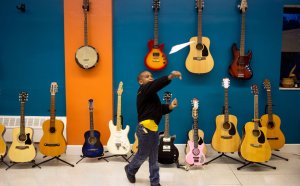
Take Music lessons
According to an article from The Telegraph online magazine, “New research suggests that regularly playing an instrument changes the shape and power of the brain and may be used in therapy to improve cognitive skills.” There is continually more evidence that musicians have organizationally and functionally different brains compared to non-musicians, especially in the areas of the brain used in processing and playing music. Some studies show that playing an instrument can increase your IQ up to 7 points.
2. INCREASE THE CAPACITY OF YOUR MEMORY
Research has shown that both listening to music and playing a musical instrument stimulate your brain and can increase your memory. A study was done in which 22 children from age 3 to 4 years old were given either singing lessons or keyboard lessons. A control group of 15 children received no music lessons at all. Both groups participated in the same preschool activities. The results showed that preschoolers who had weekly keyboard lessons improved their spatial-temporal skills 34 percent more than the other children. Not only that, but researchers said that the effect lasted long-term.
3. INCREASE MATHEMATICAL ABILITY
Reading music requires counting notes and rhythms and can help your math skills. Also, learning music theory includes many mathematical aspects. Studies have shown that students who play instruments or study the arts are often better in math and achieve higher grades in school than students who don’t.
4. IMPROVE READING COMPREHENSION
According to a study published in the journal Psychology of Music, “Children exposed to a multi-year program of music involving training in increasingly complex rhythmic, tonal, and practical skills display superior cognitive performance in reading skills compared with their non-musically trained peers.” It’s not surprising to hear results like that because music involves constant reading and comprehension. When you see black and white notes on a page, you have to recognize what the note name is and translate it to a finger/slide position. At the same time, you also have to read what rhythms the notes are arranged in and force your tongue to produce the correct pattern
5. BUILD SELF CONFIDENCE
Overcoming musical challenges that you thought you’d never quite master can give you a great sense of pride. When you first start learning how to play an instrument, it seems like just holding a note for a couple beats or hitting a high pitch is an amazing accomplishment. Many small successes will eventually breed long term, innate self-confidence.
YOU MIGHT ALSO LIKE



Share this Post
Related posts
Free Music lessons
Due to cuts in funding for music education in public schools a group of Southern California musicians has found a way to…
Read MoreBasic Music lessons
Here we cover step-by-step all the resources you’ll need to get started on the violin. This includes all the essential items…
Read More










